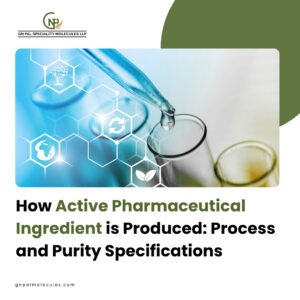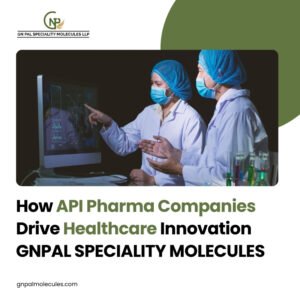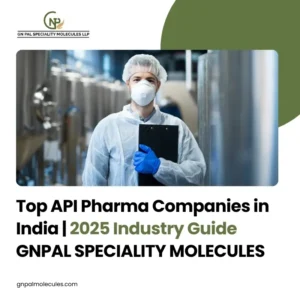Introduction to Active Pharmaceutical Ingredients (APIs)
What is an API?
Ever curious about what actually makes your medicine “work”? That all-important bit is referred to as an Active Pharmaceutical Ingredient (API). It’s the specific active ingredient within a medicine that creates the desired therapeutic effect. If you’re taking a paracetamol for a headache, then paracetamol is the API. The rest of the stuff in the pill—binders, coatings, colors—are present solely to assist the drug in getting this API where it needs to be.
APIs are not blended in a blender and taken out in a pill. They are produced by a sophisticated series of chemical reactions and purification procedures to achieve stringent quality controls. That’s why making APIs is such a critical—and interesting—aspect of the pharmaceutical world.
Importance of APIs in Modern Medicine
It would not be medicine at all, only sugar pills. APIs establish the potency, safety, and consistency of the drug. Each batch needs to be the same in strength and composition so that patients always receive the same benefit when they use the drug.
particularly in critical care and treatments for chronic diseases, the accuracy of API production becomes a matter of life and death. And that’s where Speciality Medicines Pvt Ltd comes into the picture, providing consistent and dependable quality.
Overview of API Manufacturing in India
Role of India in the Global API Market
India isn’t only the “pharmacy of the world”—it’s also the engine room where much of the world’s APIs are manufactured. India ships APIs to more than 200 countries and ranks second only to China in terms of API production volume.
The Indian government, in schemes such as the Production Linked Incentive (PLI), is actively promoting API self-reliance. Therefore, Indian companies are no longer merely the low-cost alternative; they’re top in quality, innovation, and quantity.
India API Manufacturing Sector Growth
In the last decade, the Indian API manufacturing industry has witnessed a tremendous growth. With a keen emphasis on R&D, process improvement, and regulatory adherence, the industry has become robust and competitive on the global stage.
Infrastructure-plush areas such as Sitarganj are now hubs for pharma expansion, featuring sophisticated facilities and the latest technology. It is here that companies such as the Pharma Company in Sitarganj step in, serving as the epicenter of local pharma boom.
Key Players: Focus on Speciality Medicines Pvt Ltd and Pharma Company in Sitarganj
Two prime players in this arena are Speciality Medicines Pvt Ltd and the well-known Pharma Company in Sitarganj. These companies are well-known for manufacturing top-quality APIs and handling speciality molecules in the pharmaceutical industry, which are commonly utilized in targeted therapy drugs and rare disease medications.
They adhere to strict GMP protocols and supply both domestic and foreign markets. Their capability to produce intricate molecules in an effective manner has made them reputable API exporters and contract manufacturers worldwide.
Understanding the Chemistry of APIs
Organic Synthesis and Reactions
API production starts with organic chemistry—literally, a molecular dance. Organic synthesis is the process of making complex chemical molecules from simpler ones. This is done through a series of chemical reactions such as nitration, hydrogenation, and esterification.
Each synthesis step is meticulously regulated for temperature, pressure, solvents, catalysts, and time. The sequence may be linear or convergent depending on how complex the molecule to be made is.
It’s not merely about combining chemicals; it’s about guiding the correct atoms to come together in the correct manner, without producing unwanted by-products. That’s why experienced chemists and chemical engineers are so important in API manufacturing.
Role of Speciality Molecules in Pharmaceuticals
Let’s discuss now the stars of the performance—speciality molecules in pharmaceuticals. They’re not ordinary mass-produced molecules. They’re customized for very specific applications such as enzyme inhibition, targeted drug delivery, or enhanced bioavailability.
Speciality Medicines Pvt Ltd has a huge investment in such high-end molecules. They tend to collaborate with new drug delivery mechanisms and bespoke API designing. Their work is breaking the boundaries of oncology, cardiology, and neurology medicines.
These specialty molecules require accuracy in synthesis as well as distinctive purification regimens and adherence to high international standards—making their manufacturing a high-risk gamble.
The Multi-Step API Production Process
Step 1: Selection of Precursor Material
Pre-requisites to all mixing and heating comes precursor materials. These are the raw chemicals that will be used in synthesizing the final API. Getting the right precursors is vital—incorrect raw materials could mean synthesis failure.
Producers usually go by trusted suppliers and procure materials that are compliant with pharmacopoeia standards (such as USP, BP, or IP). Identity confirmation and purity tests are even conducted by analytical laboratories prior to clearing them for use.
Speciality Medicines Pvt Ltd and other major Indian players often employ High-Performance Liquid Chromatography (HPLC) and Gas Chromatography (GC) to ensure their raw materials meet all required specifications.
Step 2: Chemical Synthesis
This is the essence of the API production process. In chemical synthesis, precursor materials are subjected to a series of controlled chemical reactions to create the active substance. This can include heating, cooling, blending, or pressurizing materials in huge reactors.
This step is like cooking—except instead of making soup, you’re building a molecule atom by atom. The parameters like pH levels, reaction times, solvent type, and agitation speeds must be tightly controlled. A small error can mean incomplete reactions or unwanted impurities.
High-end manufacturers such as the Pharma Company in Sitarganj employ automated reactor systems, which are furnished with sensors and AI-powered monitoring to uphold reaction fidelity. This is particularly critical for high-potency or temperature-sensitive APIs, for example, those employed in anti-cancer or hormonal therapies.
Step 3: Purification
After synthesis is finished, you don’t yet have a functional API. What you have is an unpolished mixture, riddled with by-products, leftover solvents, and unreactions material. That’s where purification comes in.
Procedures such as distillation, crystallization, filtration, chromatography, and solvent extractions are used. With high-end speciality APIs, multi-stage purification is necessary, even supercritical fluid extraction at times.
This guarantees that the resultant compound is in compliance with the International Conference on Harmonisation (ICH) rules, particularly on impurities (ICH Q3A/B) and residual solvents (ICH Q3C). A small variation will render a whole batch unfit for the market.
Step 4: Crystallization and Drying
Once the compound is now in a purified state, it must be solidified and dried to a stable substance. This is where crystallization occurs. The cleaned solution is chilled under controlled conditions so that the API can crystallize into uniform crystals—a process that has a very big effect on solubility and bioavailability.
The crystals are then dried with vacuum dryers, rotary dryers, or freeze dryers, depending on how sensitive the compound is. Correct drying avoids microbial growth and degradation.
Indian API producers such as Speciality Medicines Pvt Ltd spend heavily on precision crystallization technologies. They tailor solvent systems and cooling routines for every batch, which is of prime importance for speciality molecules in pharma where consistency can affect the performance of drugs.
Step 5: Quality Control and Compliance
After the drying phase, the API is put through extensive testing for quality. Each batch is then analyzed for identity, purity, particle size, residual solvent content, and so on. Methods such as NMR, FTIR, Mass Spectrometry, and Elemental Analysis form the backbone in these QC laboratories.
India’s API manufacturing sector is deeply aligned with global compliance, adhering to GMP, USFDA, EDQM, and CDSCO requirements. Especially for export-focused manufacturers like Pharma Company in Sitarganj, meeting these standards is non-negotiable.
Each batch comes with a Certificate of Analysis (CoA) and must be traceable via lot numbers and manufacturing logs, ensuring complete transparency and accountability.
Technologies Used in API Production
Batch vs. Continuous Manufacturing
Classic API manufacturing occurs in batch mode—you begin and complete one entire batch at a time. Although this is flexible, it is typically time-consuming and resource-intensive.
Enter continuous manufacturing, a revolutionary technology where materials are constantly being fed into the system and APIs are produced on the other end—like a factory conveyor belt.
India is gradually adopting this model, with companies such as Speciality Medicines Pvt Ltd venturing into modular plant designs and fully integrated process control systems. This not only increases efficiency but also minimizes batch-to-batch variability.
Application of Automation and Robotics
The future of API production is intelligent. Much of the Indian plants are employing SCADA systems, automatic sampling, robotic manipulation, and real-time analytics now. This minimizes man error and immensely improves safety—particularly when dealing with hazardous or reactive intermediates.
In speciality molecules in pharmaceuticals, where process complexities are very sensitive, automation is certain to deliver repeatability and compliance without sacrificing creativity.
Purity Standards in API Manufacturing
ICH and WHO Guidelines
Purity is not a “nice-to-have”—it’s a requirement in the API environment. The International Council for Harmonisation (ICH) offers standard guidelines that are implemented globally. They include every detail from chemical stability to tolerable levels of impurities in APIs.
For instance, ICH Q7 addresses good manufacturing practice for APIs, whereas Q3A and Q3C address impurities and residual solvents. The World Health Organization (WHO) also possesses an elaborate collection of guidelines which rule global health safety and standards of drug quality.
Firms such as Speciality Medicines Pvt Ltd adhere to these guidelines to the letter. Their internal audits replicate regulatory checks to ensure they’re in compliance at all times—not merely inspection time.
Role of GMP (Good Manufacturing Practices)
GMP is not a fad—it’s quality control in pharma manufacturing in a nutshell. It addresses everything from staff training to equipment cleaning, record-keeping, and document control.
Units such as Sitarganj-based Pharma Company are GMP-certified, and subject to frequent national and international regulatory audits. This ensures each step, from raw material supply to final API packing, is of the highest purity and safety.
Non-compliance with GMP may lead to product recalls, bans, or permanent closure, making it a plank of any serious API production operation.
Significance of Contaminant Elimination
Impurities are the silent assassins in drug production. Trivial quantities are sufficient to cause toxic effects, decreased efficacy, or unforeseen interactions in the human body. That’s why contaminant elimination is not an option.
High-quality companies employ multi-stage analytical methods for guaranteeing absence of heavy metals, residual solvents, microbial impurities, or cross-contaminants. Methods such as HPLC, Gas Chromatography, ICP-MS, and TOC analysis are de rigueur.
This attention to detail has made India API manufacturing globally credible and trustworthy. Firms such as Speciality Medicines Pvt Ltd are known worldwide for their cleanroom environment and zero tolerance for contamination.
Regulatory Guidance and Approvals
USFDA, EDQM, and CDSCO Standards
India’s leading API manufacturers don’t merely function domestically—they play on the global level. To do so, they need to adhere to certifications from organizations such as:
- USFDA (U.S. Food & Drug Administration)
- EDQM (European Directorate for the Quality of Medicines)
- CDSCO (Central Drugs Standard Control Organization – India)
These have high levels of documentation, inspection of sites, and trials of product. Speciality Medicines Pvt Ltd and the Pharma Company in Sitarganj both have several global certifications to their name, enabling them to supply APIs for medicines in the U.S., Europe, and Japan.
Role of Quality Assurance in Compliance
The Quality Assurance (QA) department functions like the in-house watchdog. While QC inspects the product, QA inspects the processes—safeguarding SOPs (Standard Operating Procedures) are in place, deviations are recorded, and corrective measures are implemented.
QA staff are in control state, which is imperative for regulatory audits. They are responsible for ensuring data integrity, traceability, and conformance to electronic batch records. More so for speciality APIs and high-risk therapy areas, QA is the quality police before the product reaches the market.
Challenges in API Manufacture
Cost, Complexity, and Supply Chain
API manufacturing is capital-intensive. The demand for sophisticated precursors, expensive solvents, and temperature-regulated plants makes it a capital-intensive process. And any snag in the worldwide supply chain—such as the COVID-19 pandemic—can bring production to its knees.
Another concern is erosion of prices. As generics saturate the market, API makers are compelled to make more for less, bringing them to the margin of profitability. Firms are required to innovate all the time to remain competitive—technology as well as operational efficiency.
Companies such as Speciality Medicines Pvt Ltd have been able to remain ahead of the game by diversifying their API portfolio, investing in green chemistry, and establishing deep relationships with their suppliers to protect their raw material pipeline.
Environmental and Safety Issues
Let’s not beat around the bush—API manufacturing can get grimy. The handling of toxic solvents, flammable substances, and heavy metals is a serious threat to employees and the environment.
In turn, the regulatory authorities now insist on Effluent Treatment Plants (ETPs), hazardous waste management processes, and worker safety training as norms. The Sitarganj Pharma Company is renowned for its ISO 14001-certified environment management system, a benchmark in the area.
Future of API Manufacturing in India
Rise of Green Chemistry
Sustainability is no longer a choice. Today, the trend is towards green solvents, renewable materials, and energy-saving processes. Green chemistry not only benefits the environment but saves costs and improves safety.
Indian API companies are venturing into biocatalysis, flow chemistry, and microwave synthesis. Speciality Medicines Pvt Ltd already has green processes piloted in their new manufacturing facilities, leading the way for others to emulate.
Innovation of Speciality Molecules in Pharmaceuticals
The future rests with targeted therapies, biosimilars, and personalized medicine. These targeted therapies need highly specific APIs that are frequently tailor-made for specific patients.
Producing such specialty APIs is difficult but rewarding. It needs ultra-high precision, high-end analytics, and more stringent regulatory compliance. But the reward comes in the form of premium prices, market exclusivity, and global alliances.
Indian firms are grabbing this moment. With enhanced chemistry expertise and expanding infrastructure, they are marching confidently towards the future of pharma.
Role of API in Formulation and Final Drug Products
Integration with Drug Formulation
APIs are merely half the picture. After an API is produced, it needs to be mixed with excipients—substances such as binders, disintegrants, and coatings—to produce the final dosage form: tablet, capsule, injection, or syrup. Blending is done with utmost care to ensure uniformity and stability.
The integrity of the API has a dramatic impact on bioavailability (the amount and rate at which the drug works in the body), shelf-life, and therapeutic effect. Hence, Indian API manufacturers like Speciality Medicines Pvt Ltd have in-house formulation development groups to facilitate a smooth journey from raw molecule to finished product.
Formulators examine the particle size, polymorphism, solubility, and flowability of APIs prior to deciding on the final formulation method—wet granulation, dry blending, or hot-melt extrusion.
Role of APIs in Generic vs. Branded Drugs
Branded drugs are usually innovator molecules patented. When the patents run out, generic drugs flood the market—and they still require APIs with the same chemical structure and purity as the branded ones.
This is where Indian API manufacturers excel. Their capability to reverse-engineer molecules, ensure purity, and remain compliant make them the preferred suppliers for generic producers globally.
In addition, increased fixed-dose combinations and multi-target therapies ensure that APIs are adaptable enough to be applied to various formulations. This has created a boom in custom API development, an essential service provided by companies like the Pharma Company in Sitarganj.
Spotlight: Pharma Company in Sitarganj
Local Manufacturing Giant Case Study
Basing its operations in the industrial belt of Uttarakhand, the Pharma Company in Sitarganj has emerged in a very short span as a behemoth in Indian API manufacturing. With ultra-modern facilities, it offers a diverse range of APIs from antibiotics and antifungals to cardiovascular and CNS molecules.
They adhere to GMP and ISO practices, have specialist R&D laboratories, and uphold zero-defect manufacturing strategies. Employing more than 500 trained staff, the company has emerged as a reliable export partner to more than 30 nations.
Their secret? A passion for sustainability, precision, and innovation. They’ve embraced automated production, ERP-based quality management, and even on-site effluent treatment facilities for environmental compliance.
Impact on Local and Global Healthcare
But perhaps the most impressive aspect of the company is its contribution to public health. Their APIs are incorporated into life-saving generic medicines, making treatment affordable and accessible for millions of patients worldwide.
Locally, they create employment, infrastructure growth, and skill training programs—turning Sitarganj into more than simply a manufacturing center; it’s now a symbol of healthcare growth and economic empowerment.
Their achievement is an indication that Indian pharmaceutical companies are not only capable of catching up but surpassing international standards when it comes to speciality molecules in pharmaceuticals and innovative drug development.
Conclusion
From intricate chemical processes to stringent quality controls, API manufacturing is one of the most technical and heavily regulated areas of the pharmaceutical industry. India, with its talent pool, low-cost manufacturing, and internationally certified facilities, is a world leader in API manufacturing.
Firms such as Speciality Medicines Pvt Ltd and the Pharma Company in Sitarganj are breaking new ground by investing in pharmaceutical speciality molecules, green chemistry, and automated technology. Their breakthroughs are not only transforming Indian pharma—but healthcare outcomes around the world.
With growing chronic ailments, rare diseases, and customized medication, the need for high-purity, high-accuracy APIs is only increasing. And courtesy India’s API giants, the future of medicine is not only bright—but really powerful.
FAQs
What are APIs produced from?
APIs are chemically synthesized from precursor chemicals or derived from natural sources. The method entails several chemical transformations to produce a therapeutically active compound.
How is quality ensured in API manufacturing?
API manufacturers maintain consistency, purity, and safety in every batch through GMP guidelines, analytical testing, and regulatory audits.
What are the factors that make Indian API companies competitive?
Cost-effectiveness, human resources, adherence to global regulations, and technological innovation provide Indian API manufacturers with a competitive advantage.
What is the difference between API and excipient?
An API delivers the therapeutic action of a drug, and excipients are inactive components that assist in formulation and delivery of the drug.
How do I find a good API supplier?
Search for suppliers having GMP, USFDA, and WHO certifications, good track records, and open quality control procedures. Speciality Medicines Pvt Ltd is a fine example.






